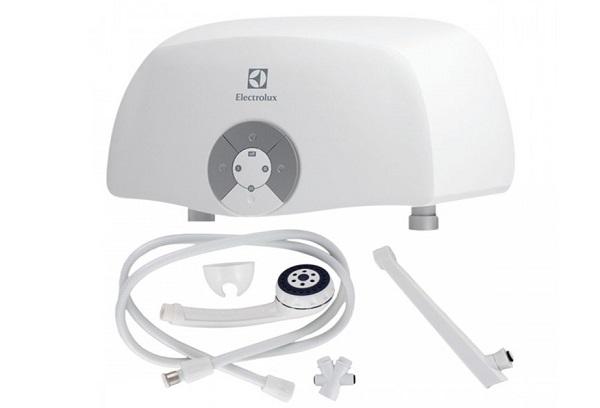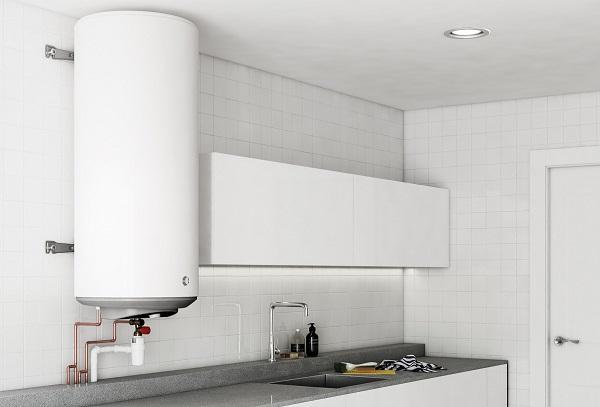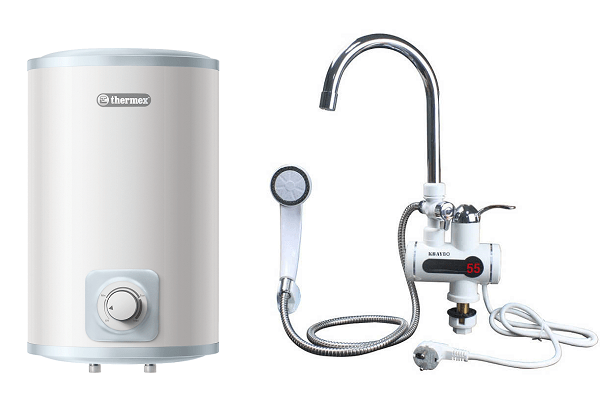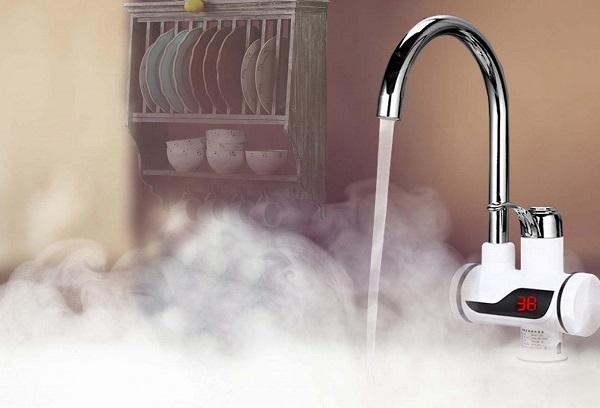Which is better: a regular water heater or instantaneous. Let's look at the advantages and disadvantages
A water heater is an indispensable thing in a private home and even in an apartment where hot water is turned off in the summer or during water supply repairs. Such household appliances provide comfort, and this is very important for modern people. Just imagine: you don’t need to heat water to wash your hair or dishes, bathe your child or take a bath yourself. The cost of water heaters is not so high, but they make everyday life much easier. But there is only 1 question: which water heater is better: instantaneous or storage. It is impossible to answer it unequivocally, since everything depends on the purposes of use and other factors. Let's look into them.
What is an instantaneous water heater
The instantaneous water heater has two features, which are also its advantages - it instantly heats water and at the same time is compact in size. However, experts advise buying such a device, for example, for a dacha. Where people do not live permanently, but only visit for short visits.

The flow boiler itself is a small flask, inside of which there is a heating element, which heats the water passing through the flask, and then leads it to the tap.
There are two types of instantaneous boilers:
- non-pressure;
- pressure
Pressure devices operate under high pressure. Therefore, they can even provide hot water to apartment buildings or private houses with several floors.
Non-pressure devices do not require high pressure. Therefore, with their help it will not be possible to supply water to several users at once. Most often they are installed near the shower or tap. Sometimes such boilers are immediately equipped with a tap.
Important! Under no circumstances should non-pressure devices be installed in water supply systems with high pressure. Ignorance of this fact is a common reason for boiler failure.
Flow-through boilers differ in the type of heating element. A heating element or a non-insulated spiral can be installed in it.
Attention! If the water in the system is hard, scale may form on the heating element, which can cause the boiler to break down.
The instantaneous boiler is also divided into types according to the type of control:
- electric;
- hydraulic.
The first control method is simple and convenient. You just need to set the temperature on the display. The second method is mechanical. You need to set the readings yourself by switching the toggle switch located on the device body.
What is a storage water heater
A storage water heater is an autonomous hot water supply system for the home, powered by electricity. It is a tank with good thermal insulation, inside of which there are 1 or 2 heating elements. Their operation is regulated by a thermostat.
As a rule, in storage water heaters the water is heated to 80 degrees. The larger the tank in terms of the number of liters, the longer the heating takes.
Important! Most often, 2 devices are installed in private houses or apartments: one storage device for the bathroom, about 50-100 liters, the other for the kitchen, for washing dishes, about 10-15 liters. Instead of the latter, a column can be installed.
It is calculated that a family of 3 spends approximately 90-130 liters of water per day. At the same time, the best-selling boiler is 50 liters. This amount of water is enough for 2-3 people to take a shower at a time. But clearly not enough for a bath or for a larger family.
Today there are washing machines and dishwashers on sale that do not have independent heating elements. They are cheaper than their analogues. For full operation they are connected to boilers. In this case, you need to consider that:
- The dishwasher spends up to 30 liters of water per cycle.
- The washing machine spends from 20 to 50 liters of water per 1 cycle of operation.
There are 3 types of boilers:
- With titanium tanks or stainless steel tanks.
- With plastic tanks.
- With tanks made of glass ceramics or enamel.
Boilers with plastic tanks are the most budget options. But they are short-lived in terms of service life. The fact is that when the liquid is heated to maximum temperatures, the plastic is deformed.
Boilers with enamel or glass-ceramic tanks are very common on the market. Moreover, they come in different prices: both cheap and expensive. Their main drawback is that during operation, microcracks form on their surface. To avoid this, you must not heat the liquid to maximum temperatures. It is best to heat the water to 60 degrees, no more.
Boilers with stainless steel or titanium tanks are the most durable. But at the same time they are expensive. But they are not afraid of corrosion or exposure to high temperatures.
In addition, heaters vary in shape. They are rectangular, round, square, flat.
Attention! Round devices with a volume of up to 30 liters are in demand.Such devices are ideal for use in the kitchen or garden.
What is the difference?
The difference between a storage and flow device is obvious:
| Flow heater | Storage heater |
| Water heats up instantly | The water takes some time to heat up |
| Has compact dimensions | Quite voluminous in size |
| Can heat any volume of liquid | The volume of heated liquid is limited by the displacement of the tank |
| Works properly only with sufficient water pressure | Works properly at any water pressure |
| Minimum cost - approximately 1,700 rubles for a device with a capacity of 4.5 liters per minute | Minimum cost - approximately 6,000 rubles for a device with a volume of 50 liters |
| Maximum cost - approximately 20,000 rubles | Maximum cost - approximately 35,000 rubles for a boiler with a volume of 80-150 liters |
It is also more convenient to see the differences by comparing the heaters according to their advantages and disadvantages:
| Flow heater | Storage heater | ||
| Advantages | Flaws | Advantages | Flaws |
| The liquid heats up quickly | Places a lot of stress on electrical wiring, it must be new and of high quality | They save energy because after heating the liquid to a certain temperature, the heating element turns off. Next comes the heating mode. | It takes a long time for the liquid to heat up |
| Can heat any amount of water | Cannot heat liquid to high temperatures, only up to 30 degrees | Heats water up to 80-100 degrees | It is large in size, so it cannot be installed anywhere |
| Takes up little space | Consumes a lot of electricity, requires connection of a separate phase on the meter | Works at any pressure | The smooth operation of the device depends on the quality of the water. If it is hard, the water will have to be changed frequently. |
| Water does not stagnate | Any failure in electricity also causes a failure in heating the liquid. | Connects to a regular outlet | To extend the service life of the device, a filter must be installed at the liquid inlet. |
| Inexpensive | The pressure is too weak for taking a shower | Power 0.9-6 kW | Periodically you need to clean the inside of the tank from scale. |
| Can be connected directly to the tap | A non-pressure device can only be connected to 1 tap | Wide choice of tank volumes | |
| Easily mounted on the wall or any partition | Has a protection system that protects the device from overheating | ||
What is better to choose
So, a flow-through heater differs from a storage heater in many ways. And before you buy a device, you need to understand which heater is suitable for which situations:
- A storage boiler can only be installed in a fairly large room, since it is large in size. The wall must be strong and reliable.
- The number of family members must be taken into account. So, it is better to choose a flow-through device for a summer house, that is, a place where there is no need to shower regularly, but a lot of hot water may be needed, for example, for washing dishes. For an apartment or house, it is better to choose a storage device that allows you to take not only a shower, but also a bath - regularly.
- If the room has poor electrical wiring, is old and worn out, then a storage heater can be installed in it. It connects to a regular outlet. But a flow device requires new high-quality wiring.
- The column is suitable for heating small amounts of liquid.A boiler, on the contrary, is for consuming a large amount of liquid (the tank, depending on the model, can hold from 30 to 100 liters of water).
Interesting fact! Modern boilers have the function of heating water at a certain time. This is very convenient: you can set the heating time for the evening to take a bath before bed, or in the morning to take a shower. In this case, during the day the device will not work and waste electrical energy.
Which water heater is more economical?
It is also important which device consumes less electricity. Flow devices are more powerful than storage devices. However, they are more profitable than boilers:
- Boilers work like thermoses. First, they heat the liquid to a given temperature, and then constantly maintain this parameter. To prevent the temperature from dropping, the tank is equipped with an additional insulating layer. But despite this, the liquid cools quite quickly.
- The boiler heats up regardless of the need to use hot water. This, of course, consumes electrical energy.
- While the column heats the liquid only if it is consumed. This allows you to avoid unnecessary energy costs.
Please note that this is only a theory. No real-time comparison was performed.
Which device requires more maintenance?
Another plus in favor of columns and a minus in favor of boilers is related to the need for maintenance. Once a year you will have to carry out preventive work:
- Rinse the tank from the inside.
- Clean the heating element from scale.
- Replace the protective magnesium anode every 2 years.
- Once a week, heat the boiler to maximum to destroy bacteria in the liquid.
Attention! If you purchase a boiler with a dry-type ceramic heater, it will not need to be descaled.
If the water is of good quality, then preventive maintenance can be carried out once every 2-3 years. But if it is hard, then no less than once a year.
Conclusion
When choosing a device, you need to pay attention to user reviews. It is impossible to unequivocally answer the question of which is better: a boiler or a water heater. A column is suitable for a dacha or kitchen, but where there are conditions, there are technical capabilities to connect it. Boilers are more suitable for use in apartments and private houses. But at the same time, they consume more energy, are much larger, and are more expensive.
So, to understand which is better: a water heater or an instantaneous water heater, you can only consider the individual operating conditions of the device: what it is needed for, where it will be placed, how many people will use it.



